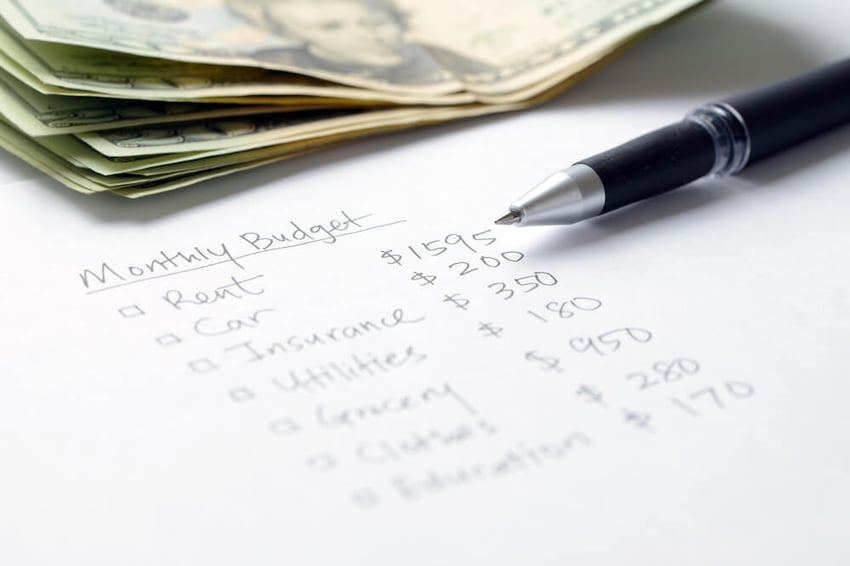
16 Good Financial Habits You Should Have
Published by 121FCU on
Nov 16, 2020 2:14:52 PM

Financial freedom is not some lofty and unattainable fantasy, but rather a practical objective and a realistic approach to managing money responsibly. You can put yourself on the path to financial freedom and all the rewards it brings you by practicing good financial habits and avoiding bad ones. Failure to learn these simply skills can lead you to keep making the same financial errors over and over again, failing to ever transcend your current financial condition.
Learning and incorporating these sound financial habits into your daily life, however, can make financial responsibility become second nature and puts its rewards in quality of life and peace of mind at your behest.
Upon completion of this article, you will find yourself armed with a handful of practical, realistic and achievable skills and habits that you can put to work for your own financial betterment.
Upon completion of this article, you will find yourself armed with a handful of practical, realistic and achievable skills and habits that you can put to work for your own financial betterment.
16 Good Financial Habits to Take On
As you initially read through these 16 healthful suggestions, hone on the ones in particular that you find may be easiest for you to start. Rather than try to take on too many new habits at once, start incrementally with the ones you feel most empowered to succeed.
Then, with some of those initial successes under your belt, you can feel the extra energy, motivation and self-confidence you need to take on some of the more daunting new habits from which you could benefit perhaps even further.
1. Live Inside Your Means
Living within your means is the root of all other good financial habits. Before you can work on expanding your means, you need to be able to make your current resources work best for you.
In order to do that, you may need to cut back on some expenses, or even cut others out altogether. Prioritizing will play a big role in this process, as you can't simply give up everything.
The moment you start keeping your expenses lower than your income is the moment you can start thinking about saving for later or potentially increasing your quality of life somehow.
2. Make Your Goals Specific
The more specific you make your monetary goals, the easier you can achieve them and, if necessary, make any appropriate and necessary adjustments along the way.
Specific goals, to put it another way, attract specific solutions. Your financial goals should therefore be specific, measurable, realistic, timely and attainable.
Don't just pine for money, for example. Set a goal of earning an extra $5,000 in one month's time in order to pay for an essential car repair before your next vacation.
See the difference?
Specific goals lead to specific action steps that, in turn, lead to measurable results.
If you find yourself having difficulty attaining a particular goal, examine it by the aforementioned criteria.
Check whether your goal might not actually be too vague, unquantifiable, fantastical, inconveniently or inappropriately timed or simply unattainable to realize, and, if it is, find a way to reframe it so it is achievable.
Not everything you feel compelled to purchase or spend money on is an essential item. What qualifies as one and what doesn't is entirely up to you, but a differentiation between needs and wants does, and must, exist somewhere in everyone's life.
Clarifying this distinction can go leaps and bounds towards helping you prioritize your expenditures and avoid frivolous or whimsical purchases. Start by listing everything you need each day, week and month in order to survive.
Then, and only then, add in those elements you also want to include in your regular life, if at all possible. Just be clear that, if ever any trimming is to become momentarily necessary, it's from your wants that the trimming should occur.
By never sacrificing your needs, you always make sure that your basic requirements are covered so you can go about the business of expanding upon your abundance.
A budget may sound boring and, even, potentially restrictive, but it actually can be a powerful tool you can use to give yourself more of what you want.
3. Differentiate Needs From Wants
Not everything you feel compelled to purchase or spend money on is an essential item. What qualifies as one and what doesn't is entirely up to you, but a differentiation between needs and wants does, and must, exist somewhere in everyone's life.
Clarifying this distinction can go leaps and bounds towards helping you prioritize your expenditures and avoid frivolous or whimsical purchases. Start by listing everything you need each day, week and month in order to survive.
Then, and only then, add in those elements you also want to include in your regular life, if at all possible. Just be clear that, if ever any trimming is to become momentarily necessary, it's from your wants that the trimming should occur.
By never sacrificing your needs, you always make sure that your basic requirements are covered so you can go about the business of expanding upon your abundance.
4. Develop a Budget
A budget may sound boring and, even, potentially restrictive, but it actually can be a powerful tool you can use to give yourself more of what you want.

By developing a budget that includes sections for both your fixed and variable expenses, you can make sure that you have enough money for both your needs and your wants.
Knowing where your money for each of your essential life needs is coming from also frees you from having to worry about meeting that expense so you can focus on the more valuable and rewarding tasks of increasing your means and reaping those rewards.
Automating your finances is one way to make sure you get all your financial responsibilities met on time. When you "set it and forget it", your bills all get paid on time and you avoid paying unnecessary penalties and late fees.
You also avoid the undesirable scenario of running out of money to pay a bill right when it comes due. What's more, you help build and maintain a good credit rating that you can later use to increase your means and quality of life or navigate an emergency or unexpected life crisis.
There's another aspect of your finances you can automate too besides bill payment and that's your savings. As you review the next section on paying yourself first regarding establishing a regular savings, consider automating that savings so you can also "set it and forget it" with the same confidence and effectiveness with which you automate your bill payment.
Chances are, if you wait to pay yourself in savings until after all your other expenses are met, you won't have any money left to put into savings.
Knowing where your money for each of your essential life needs is coming from also frees you from having to worry about meeting that expense so you can focus on the more valuable and rewarding tasks of increasing your means and reaping those rewards.
5. Automate It
Automating your finances is one way to make sure you get all your financial responsibilities met on time. When you "set it and forget it", your bills all get paid on time and you avoid paying unnecessary penalties and late fees.
You also avoid the undesirable scenario of running out of money to pay a bill right when it comes due. What's more, you help build and maintain a good credit rating that you can later use to increase your means and quality of life or navigate an emergency or unexpected life crisis.
There's another aspect of your finances you can automate too besides bill payment and that's your savings. As you review the next section on paying yourself first regarding establishing a regular savings, consider automating that savings so you can also "set it and forget it" with the same confidence and effectiveness with which you automate your bill payment.
6. Pay Yourself First
Chances are, if you wait to pay yourself in savings until after all your other expenses are met, you won't have any money left to put into savings.
Far more effective is to set aside a predetermined amount of your income that you won't need to live on as savings as soon as you get paid each period.

If you can set this payment to be withdrawn from your paycheck automatically each pay period so you don't even see the money before it's siphoned off into savings, all the better.
Whether it's a particular percentage of your pay or a set dollar amount, committing a certain portion of your income to savings each period helps you start building wealth now, even whilst you still struggle to juggle your current financial obligations.
It's a way to start experiencing the rewards of affluent living right away, even before your life perhaps provides you the evidence that you're doing as much.
Possible accounts into which you can place this regular savings include:
It's a way to start experiencing the rewards of affluent living right away, even before your life perhaps provides you the evidence that you're doing as much.
Possible accounts into which you can place this regular savings include:
- Vacation fund
- Education fund
- Emergency fund
- Health Savings Account (HSA)
- Retirement account (Traditional or Roth IRA or employer-sponsored 401(k)
7. Track Your Spending
The only way you can know how to more effectively put the money you make to work for you is to get 100% clear on how you're currently applying it.
Track every expense so you know where every penny you earn goes.

This way, you can make any adjustments necessary to live more happily within your means, whether that's by increasing your means or decreasing your spending.
Fortunately, you can find many budgeting apps to download and install on your phone that can help you do just this with relative ease.
When you spend money on credit, you're essentially borrowing funds you don't have to spend. Only when you spend money on debit are you spending actual money you've already earned.
8. Switch From Credit to Debit
When you spend money on credit, you're essentially borrowing funds you don't have to spend. Only when you spend money on debit are you spending actual money you've already earned.
One way to avoid wracking up debt, therefore, is to only spend money that's actually already in your possession, aka on debit.

With a debit card, you may run the risk of a charge being declined if you don't have the money already available to pay for it, but at least you won't be wracking up high-interest debt on expenses you couldn't really afford.
Note: Be sure to activate overdraft protection with your bank so essential charges are met even if your account is temporarily running short. Sure, you'll probably get charged a penalty fee for overdrafts your bank approves, but at least the given bill gets paid on time without any service interruption or late fee applied.
When you pay your credit card bills each month, make more than the minimum payment.
9. Pay More Than The Minimums
When you pay your credit card bills each month, make more than the minimum payment.
Just by paying a little bit more than the required minimum payment each month, you can cut months and years off the time it takes you to pay back your debt and cut tens, hundreds or even thousands of dollars in interest charges off your total overall payment.
You can generally see on the credit card bill itself how many months it will take you to pay off the current balance if you only make the minimum payments and how much overall that will cost you over the life of the debt.
You can generally see on the credit card bill itself how many months it will take you to pay off the current balance if you only make the minimum payments and how much overall that will cost you over the life of the debt.
You can then usually see a comparison beside that showing how much time you can cut off your pay period and how much in interest charges you can cut off your overall cost of the debt by paying just a certain amount extra with each installment.
Just because you currently owe a certain amount on a certain bill doesn't mean you're necessarily locked into that debt.
10. Negotiate Down Your Bills
Just because you currently owe a certain amount on a certain bill doesn't mean you're necessarily locked into that debt.
By taking just a little initiative, you may actually find you're able to negotiate that figure down some.
Many vendors and service and utility providers are willing to negotiate payments and terms with their customers.

Consider calling any of the following types of service providers to see if you could get a discount on your rate:
- Cable
- Cell and home phone service
- Credit cards
- Insurance (auto, home, life, disability)
- Internet service
11. Participate in Employer-sponsored Retirement
If your employer sponsors a retirement plan, participate in it as much as you possibly can. Contribute the maximum proportion that you can afford so you can receive the maximum employer match available to you with your plan.
An employer match is essentially free money, and if you can afford to do what it takes to get the maximum of that available amount, it can be well worth doing.
With many employer-sponsored retirement plans, contributions are pretax, effectively reducing your taxable income and, therefore, your current tax liability.
With many employer-sponsored retirement plans, contributions are pretax, effectively reducing your taxable income and, therefore, your current tax liability.
If your employer offers no such retirement plan, consider opening your own self-directed one, such a Traditional IRA or Roth IRA.
Then, make regular contributions into this account and, if at all possible, meet the savings cap each year, allowing yourself the maximum retirement tax advantage on your savings that earnings year.
If you have any extra money you don't need to pour into your budget, including savings, every month, consider investing that extra in an account that can earn compound interest on the money.
Then, make regular contributions into this account and, if at all possible, meet the savings cap each year, allowing yourself the maximum retirement tax advantage on your savings that earnings year.
12. Invest the Extra
If you have any extra money you don't need to pour into your budget, including savings, every month, consider investing that extra in an account that can earn compound interest on the money.
Rather than sitting in a piggy bank doing you no good, your money can be earning interest in a money market account, CD or other interest-bearing savings vehicle, and that money, subsequently, will also start earning interest.
In this way, you can start to build quite a sizable nest egg with quite a modest starting amount.
Passive income is a way to increase your means without increasing your workload. There are several ways to start building passive wealth, and you don't have to pick just one.
Investing, as suggested previously, is one such way to earn passive income, but it isn't the only way. You can also own rental properties or rent out room in your home, such as through AirBNB, or you can set up some other side business to bring in a few extra bucks.
Try to find a new income source that doesn't require an exorbitant initial expense of time or money on your part.
One way to cut down on your meal expenses is to stop eating out every day you work away from home. Instead, prepare yourself a packed lunch.
13. Increase Your Means With Passive Income
Passive income is a way to increase your means without increasing your workload. There are several ways to start building passive wealth, and you don't have to pick just one.
Investing, as suggested previously, is one such way to earn passive income, but it isn't the only way. You can also own rental properties or rent out room in your home, such as through AirBNB, or you can set up some other side business to bring in a few extra bucks.
Try to find a new income source that doesn't require an exorbitant initial expense of time or money on your part.
14. Pack Your Lunch
One way to cut down on your meal expenses is to stop eating out every day you work away from home. Instead, prepare yourself a packed lunch.
In addition to the cost-savings it provides you, you also get the satisfaction of preparing tasty and healthful meals for yourself that you know you'll enjoy.
Packing your own lunch can have the added benefit of encouraging you to prepare more of your meals for breakfasts and dinners as well. Cooking for yourself tends to promote healthier eating than when you eat out or order in.
Ridesharing to work is an effective way to cut down on the cost of your commute while providing you an additional social and networking outlet.
Packing your own lunch can have the added benefit of encouraging you to prepare more of your meals for breakfasts and dinners as well. Cooking for yourself tends to promote healthier eating than when you eat out or order in.
15. Rideshare
Ridesharing to work is an effective way to cut down on the cost of your commute while providing you an additional social and networking outlet.
You and a few neighbors could share the cost of gas, tolls, parking and maintenance on one or more of your vehicles.
As you have seen, there are many ways you can take greater control over your financial life and, in so doing, become empowered to live a greater quality of life and pursue more of your goals and dreams.
Summary
As you have seen, there are many ways you can take greater control over your financial life and, in so doing, become empowered to live a greater quality of life and pursue more of your goals and dreams.
Don't let yourself get trapped on the tireless treadmill of attempting to keep up with your neighbors or some higher ideal of attainment.
Rather, determine your needs and wants, and strategize how best to meet them. Likewise, closely examine your means, and strategize how best to live within them.
The sooner you begin adopting better, more healthy, proactive and financially sound habits like those listed above, the sooner you can see your life starting to take more of the shape you've been wanting it to take for so long.
For assistance setting up the financial systems that can help you achieve these visions, call us at 904-723-6300 or visit us at one of our locations across the Jacksonville, FL area.
Rather, determine your needs and wants, and strategize how best to meet them. Likewise, closely examine your means, and strategize how best to live within them.
The sooner you begin adopting better, more healthy, proactive and financially sound habits like those listed above, the sooner you can see your life starting to take more of the shape you've been wanting it to take for so long.
For assistance setting up the financial systems that can help you achieve these visions, call us at 904-723-6300 or visit us at one of our locations across the Jacksonville, FL area.
Tags:
Finance 101
